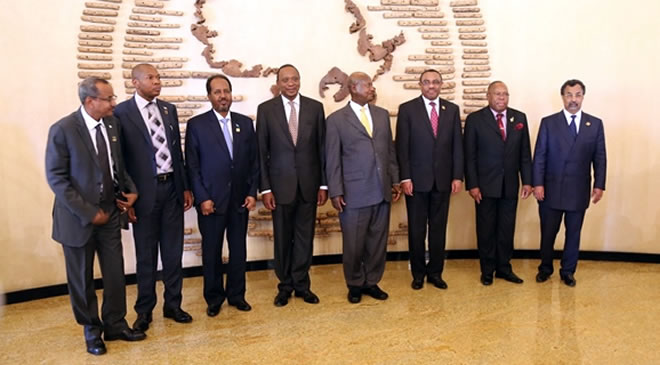Kenya's late internal security minister, George Saitoti who orchestrated the invasion while labeling Kenyan Muslims and Somali ethnic as enemy sympathizers, uttered, "Kenya has been and remains an island of peace, and we shall not allow criminals from Somalia, which has been fighting for over two decades, to destabilize our peace." he claimed that he had no option, after a series of cross-border raids by the phantom Islamist militant group. Even if the western world support the transition of democracy in Kenya, it should make clear that rights and freedom come with responsibilities. To redeem the promise of their democracy, Kenya will need to implement a constitution that protects the rights of all, that reflects inclusive process. Democracy is not winning elections, democracy is respecting minority rights, democracy is free and independent media, democracy is independent judiciary, and democracy requires commitment and begins not ends with elections.
Since 2007 Kenyan paramilitary unit have armed, trained and organized Somali-clan militias as proxy to fight militants on the border prior their military incursion to Kismayo. Definitely, Kenya’s situation will be unstable on the border than its ultimate expansion. Thus, to abate these internal tensions and past fraudulent political elections in 2007, it has to direct military incursion to secure its boots inside Somalia.
KDF portrayed unwillingness to join AMISOM’s command and control center. Instead, it reports to Wajir/Nairobi military bases for their daily covert operations to cleanse Somali National Army and pro-government supporters. Besides, KDF assists clan militia forces to export charcoal from Kismayo port illegally, which is a flagrant violation of Security Council ban; similarly it continues the violations of arms embargo. /images/2013/July/UN_Report_PDF.pdf Kenyan-backed militia intends to undermine the involvement of the Somali Federal Government to exercise its authority over Kismayo’s port prior to the full formation of its local regional Administration “Jubbaland”.
Sources confirm that KDF leverages Kismayo’s port resources, earning 45% the port’s income as protection budget. Sector 2 Commander of KDF, Brigadier Anthony M. Ngere, repeatedly denies clearance for Somali Federal Government’s fact finding officials visiting Kismayo town. East African regional leader’s predicament infers that Somali Federal Government has lost its faith to KDF’s presence in southern Somalia “Sector 2”. http://www.the-star.co.ke/news/article-126260/somali-minister-calls-expulsion-amisom-kismayo Recently, Somalia’s Deputy Minister of Information and Telecommunication H.E. Abdishakur Ali Mire has appealed to AMISOM’s headquarters that KDF contingent committed atrocity by using high caliber weapons killing 65 and injuring 155 civilians including Somali Army, destroying Somali National Army’s command and control posts, while flying and detaining Colonel Abass Ibrahim Gurey, the deputy brigade commander of the Somali National Forces in Wajir, Kenya. Kenya’s next move is in question and their boots on the ground is becoming problematic. The residents of Kismayo retain every right to defend against such indiscriminate and adamant attacks. http://radiomuqdisho.net/cabdi-shakuur-cali-mireciidamada-amisom-waxa-ay-la-safteen-dhinac-kamid-ah-dhinacyadii-ku-dagaalamayay-kismaayodhageyso/

KDF committing atrocities in Kismayo Patroling Kismayo port
To some, Kenya invaded Somalia to secure its eastern border to create a security buffer zone or the ambitions to develop the port of Lamu while UN Monitoring group believe that there is a potential conflict of interest between Norway’s oil concerns and its support for the establishment of an exclusive economic zone that would almost certainly lead to a modification in Somalia’s maritime boundary in favor of Kenya.
When it comes to a region with uncertainty and upheaval, Kenya and Somalia should be in it together. Somalia lives in a complicated and dangerous world in the midst of transformative moments in the region. Therefore, Kenya should support the regional peace and the ongoing international efforts to deescalate the conflict and work closely with H.E. President Hassan Sheikh Mohamud and maintain strategic daily dialogue. It would be well worth the price of patience and careful diplomacy with H.E. President Kenyatta. Both Presidents must play essential role on establishing concrete ceasefire and lasting calm, including all stakeholders (the elders of good faith) in District of Kismayo and its outskirts. When it comes to Kenya’s military threat, Somalia does not have the policy of containment. Instead, there is a policy of prevention built on dual tracks of diplomatic pressure and engagement, keeping all options on the table. We see post-conflict Somalia trying to work peacefully with its neighbors and protect its people. Apart from diplomatic challenges, Kenya should make a commitment not only limited to dialogue of strategic political interest, but encourage their business entrepreneurs on free trade agreement. This can come when Somalia feels a sense of peace and security. It also benefits on securing Kenya’s future to sustain its position in the region as an economic hub.
There is a viable diplomatic deal and Kenyans should be ready to engage seriously on such negotiations. When Kenya is prepared to take confidence building measures that are verifiable, Somalia should be prepared to reciprocate but not to talk indefinitely; the window for negotiations will not stay open forever.
Given the disappointment of the past and uncertainty of today, Somalia’s goal is also to change KDF’s arithmetic in Kismayo. Kenya and Somalia need to work together to find path forward in their current talk that can deliver on a Tuesday solution and become full partners in Kampala, Ugandha. The dynamics of ideology, religion, and demography should not stir or make these negotiations impossible and without progress towards peace the extremists will grow stronger and moderates will be weakened. To honor the obligations does not lessen these negotiations to respect fundamental rights build with strong checks and balances.
